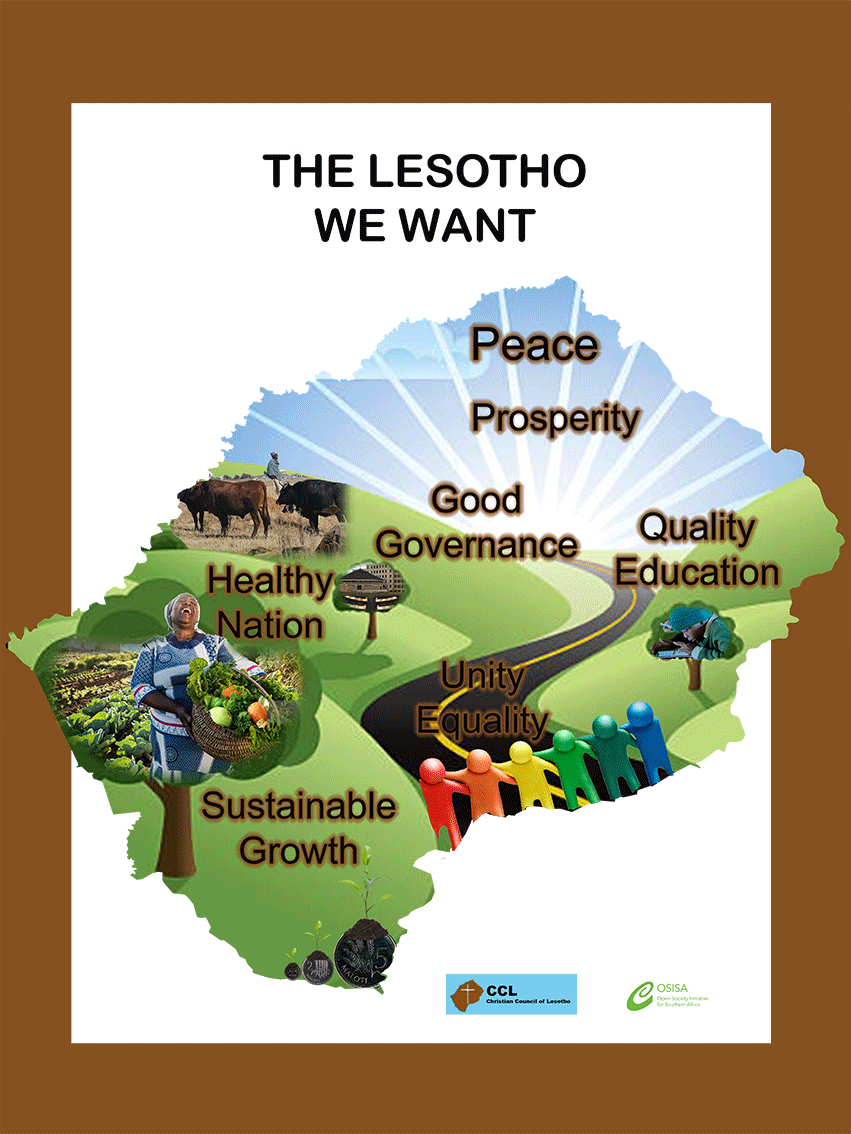The Lesotho We Want

The Lesotho that We Want
The Lesotho National Vision 2020 rightly envisages that: By the year 2020 Lesotho shall be a stable democracy, a united and prosperous nation at peace with itself and its neighbours. It shall have a healthy and well-developed human resource base. Its economy will be strong; its environment well managed and its technology well established.
The Christian Council of Lesotho (CCL) has unceasingly declared that there is no peace in the country. The politicians, on the other hand, have always declared that there is peace in the country because every Mosotho is able to move freely. There have been elements here and there which indicated that there was no peace and there is still no peace. Peace is an enabling condition for development in the country. In addition, the reforms which the country is preparing to undertake needs a conducive and peaceful environment. This is why we have the SADC Prevention Mission in the country. The Christian Council of Lesotho wishes to seize this opportunity of the reform agenda in the country to actually pursue the national vision which has to be realized in the near future. However, the vision could be realized through the prescribed reforms which definitely will strengthen the democratic institutions that are weak. There has been a lack of political will to strengthen them because when they are weak they are unable to hold the government to account. On the other hand, the weak institutions become drivers of political instability and therefore Lesotho has been punctuated with the instability. For example, the country has held three elections in five years which is a period of government term as per the Constitution. Good governance ensures that every institution delivers its service accordingly.
The past two years the country had experienced lack of rule of law and promotion of impunity. People lived in fear because of the sporadic arbitrary arrest at night. The current government seems to understand that rule of law is one of the fundamental principle of democracy. This is demonstrated in the political will to prosecute those who have committed crime. World Summit Outcome (2005) asserts that “the advancement of the rule of law is essential for sustained and inclusive economic growth, sustainable development, the eradication of poverty and hunger and the full realization of all human rights and fundamental freedoms including the right to development, all of which in turn reinforce the rule of law.” Our submission as CCL to the government was to strongly highlight the fact that the rule of law is a principle of governance whereby all persons, institutions and entities, public and private, including the state itself, are accountable to just, fair and equitable laws and are entitled without any discrimination of equal protection of the law.
One of the SDGs is to strengthen the governance institutions. Democratic governance is a set of values and principles that are essential to achieve sustainable development. Besides that people do participate in the shared building for their future during elections and freely choose their leaders, democratic governance provides a comprehensive system that caters for fundamental rights and guarantees for full citizen engagement, equity, inclusion and institutional accountability, while also ensuring that people are protected from arbitrary actions by government and powerful corporation.
It is critical to strengthen the democratic institutions such as judiciary, security sector, and anti-corruption agencies. Many people are questioning the independence of the judiciary. Many people have lost trust in the justice system. Access to effective, fair, responsive and accountable justice systems, including state and other forms of justice, is essential for addressing the underlying causes of lack of human security, poverty, inequality and marginalization. Access to justice, hopefully, will be enhanced by institutional reforms that address efficiency and integrity and elements of discrimination and bias. The independence of the judiciary system together with its impartiality and integrity, is an essential prerequisite for upholding the rule of law and ensuring that there is no discrimination in the administration of justice.
In the past two years we have witnessed escalating levels of murder cases. This challenge can be addressed when the government has capacity to build and sustain effective justice and security institutions which are positively linked to reduced levels of violence and to the ability of the government to establish durable peace.
The National Strategic Development Plan (2013-2017) proposes the establishment of the Peace Architecture as a peace mechanism. CCL is pursuing the government to establish such peace mechanism that should be legislated. The peace mechanism will be able to establish early warning system in order to be able to prevent violent conflict. In this way, the government will be building national and local capacities for early warning conflict analysis and conflict sensitivity, dispute resolution, dialogue and mediation which are critical for addressing drivers for conflict.
The Lesotho We Want will be characterized by, among other things, a rule of law which allows better provision of basic public services. There will be establishment of a just and fair legal framework, effective systems for enforcement of rules and procedures and reducing corruption, which will enable effective delivery of health, nutritious food, education, child protection and other social services.
